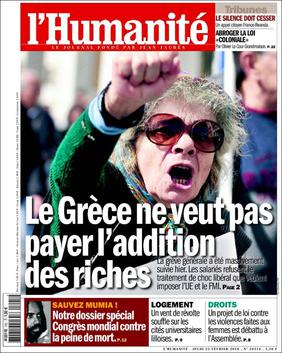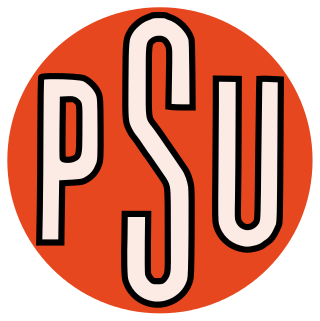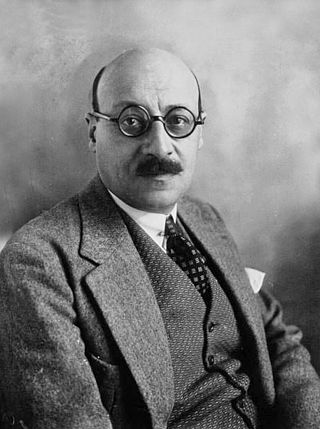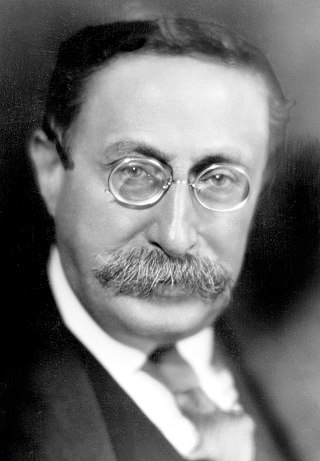The Popular Front was an alliance of French left-wing movements, including the communist French Communist Party (PCF), the socialist French Section of the Workers' International (SFIO) and the progressive Radical-Socialist Republican Party, during the interwar period. Three months after the victory of the Spanish Popular Front, the Popular Front won the May 1936 legislative election, leading to the formation of a government first headed by SFIO leader Léon Blum and exclusively composed of republican and SFIO ministers.

L'Humanité is a French daily newspaper. It was previously an organ of the SFIO, de facto, and thereafter of the French Communist Party (PCF), and maintains links to the party. Its slogan is "In an ideal world, L'Humanité would not exist."

Maurice Thorez was a French politician and longtime leader of the French Communist Party (PCF) from 1930 until his death. He also served as Deputy Prime Minister of France from 1946 to 1947.

Marcel Déat was a French politician. Initially a socialist and a member of the French Section of the Workers' International (SFIO), he led a breakaway group of right-wing Neosocialists out of the SFIO in 1933. During the occupation of France by Nazi Germany, he founded the collaborationist National Popular Rally (RNP). In 1944, he became Minister of Labour and National Solidarity in Pierre Laval's government in Vichy, before escaping to the Sigmaringen enclave along with Vichy officials after the Allied landings in Normandy. Condemned in absentia for collaborationism, he died while still in hiding in Italy.
The Cartel of the Left was the name of the governmental alliance between the Radical-Socialist Party, the socialist French Section of the Workers' International (SFIO), and other smaller left-republican parties that formed on two occasions in 1924 to 1926 and in 1932 to 1933. The Cartel des gauches twice won general elections, in 1924 and in 1932. The first Cartel was led by Radical-Socialist Édouard Herriot, but the second was weakened by parliamentary instability and was without one clear leader. Following the 6 February 1934 crisis, President of the Council Édouard Daladier had to resign, and a new Union Nationale coalition, led by the right-wing Radical Gaston Doumergue, took power.

The Unified Socialist Party was a socialist political party in France, founded on April 3, 1960. It was originally led by Édouard Depreux.

Ludovic-Oscar Frossard, also known as L.-O. Frossard or Oscar Frossard, was a French socialist and communist politician. He was a founding member in 1905 and Secretary-General of the French Socialist Party (SFIO) from 1918 to 1920, as well as a founding member and Secretary-General of the French Communist Party (PCF) from 1920 to 1922.
The Tours Congress was the 18th National Congress of the French Section of the Workers' International, or SFIO, which took place in Tours on 25–30 December 1920. During the Congress, the majority voted to join the Third International and create the French Section of the Communist International, which became the French Communist Party in 1921.
Tripartisme was the mode of government in France from 1944 to 1947, when the country was ruled by a three-party alliance of communists, socialists and Christian democrats, represented by the French Communist Party (PCF), the French Section of the Workers' International (SFIO) and the Popular Republican Movement (MRP), respectively. The official charter of tripartisme was signed on 23 January 1946, following the resignation of Charles de Gaulle, who opposed the draft of the constitution. The draft envisioned a parliamentary system, whereas de Gaulle favored a presidential system.

Legislative elections were held in France on 10 November 1946 to elect the first National Assembly of the Fourth Republic. The electoral system used was proportional representation.
Legislative elections were held in France on 2 June 1946 to elect the second post-war Constituent Assembly designated to prepare a new constitution. The ballot system used was proportional representation.

Legislative elections were held in France on 21 October 1945 to elect a Constituent Assembly to draft a constitution for a Fourth French Republic. A total of 522 seats were elected through proportional representation; women were allowed to vote for the first time.
The Third Force was a political alliance during the Fourth Republic (1947–1958) which gathered the French Section of the Workers' International (SFIO) party, the Democratic and Socialist Union of the Resistance (UDSR), the Radicals, the Popular Republican Movement (MRP) and other centrist politicians who were opposed to both the French Communist Party (PCF) and the Gaullist movement. The Third Force governed France from 1947 to 1951, succeeding the tripartisme alliance between the SFIO, the MRP and the PCF. The Third Force was also supported by the National Centre of Independents and Peasants (CNIP), which succeeded in having its most popular figure, Antoine Pinay, named Prime Minister in 1952, a year after the dissolving of the Third Force coalition.

French legislative elections to elect the 16th legislature of the French Third Republic were held on 26 April and 3 May 1936. This was the last legislature of the Third Republic and the last election before World War II. The number of candidates set a record, with 4,807 people vying for 618 seats in the Chamber of Deputies. In the Seine Department alone, there were 1,402 candidates.

The 1919 legislative election, the first election held after World War I, was held on 16 and 30 November 1919.
The Social Democratic Party of Madagascar is a political party in Madagascar.
The Democratic Socialist Party was a French socialist political party during the French Fourth Republic, founded on 24 August 1945 by members expelled from the French Section of the Workers' International (SFIO) following the Liberation of France for wartime collaboration with the German occupiers. These included Émile Berlia, Albert Bedouce and Antoine Ellen-Prévot
The French Turn was the name given to the entry between 1934 and 1936 of the French Trotskyists into the French Section of the Workers' International. The French Turn was repeated by Trotskyists in other countries during the 1930s.

The Socialist Party is a French centre-left and social-democratic political party. It holds pro-European views. The PS was for decades the largest party of the "French Left" and used to be one of the two major political parties in the French Fifth Republic, along with The Republicans. It replaced the earlier French Section of the Workers' International in 1969 and is currently led by First Secretary Olivier Faure. The PS is a member of the Party of European Socialists, Progressive Alliance and Socialist International.

The Left in France The distinction between left and right wings in politics derives from the seating arrangements which began during the Assemblee Nationale in 1789. During the 1800s, left largely meant support for the Republic, whereas right largely meant support for the monarchy.










